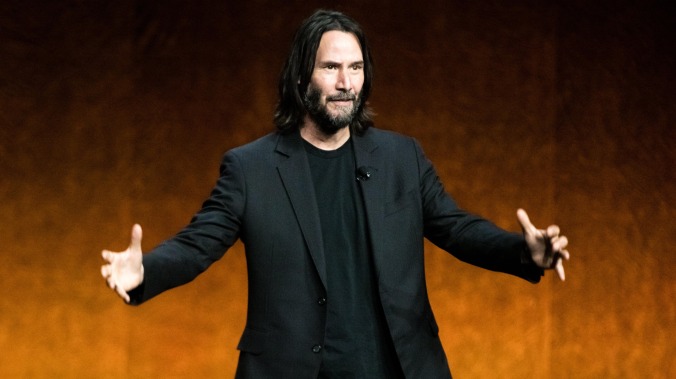Keanu Reeves has a lot to say on AI, deepfakes, VFX, and the metaverse
As Hollywood's go-to sci-fi leading man, Keanu Reeves has put some thought into the pitfalls of technology

Keanu Reeves has been a major face in sci-fi for decades now, starting with Bill & Ted’s Excellent Adventure, then The Matrix, and later John Wick. As it turns out, consistently engaging with hypothetical futures and advanced technology forces you to think on modernity a lot, especially as ideas move from the silver screen to real life. In a new interview with Wired, Reeves shares his thoughts on current tech crises such as AI, deepfakes, and the metaverse.
When it comes to his work on-screen, Reeves apparently put it in his contract years ago that his performances could not be digitally altered without his permission. Working in an industry that’s increasingly relying on VFX, Reeves did not want to be cut out of the equation when it came to the end result.
“I don’t mind if someone takes a blink out during an edit. But early on, in the early 2000s, or it might have been the ’90s, I had a performance changed,” he says. “They added a tear to my face, and I was just like, ‘Huh?!’ It was like, I don’t even have to be here.”
As John Wick: Chapter 4 director Chad Stahelski says in the interview with Reeves, “You can’t beat the blood, sweat, and tears of real people.”
Reeves seems very intent on the human component of sci-fi and technology, stating he’s less interested in the genre itself and is more “interested in the storytelling of humans and their interactions with technologies.” One of the major technological advances people are having to grapple with is the uncontrollable use of deepfakes, as seen with the fake Russian Bruce Willis commercials and accelerated by new applications allowing the technology to advance every day.
“What’s frustrating about that is you lose your agency,” he says. “When you give a performance in a film, you know you’re going to be edited, but you’re participating in that. If you go into deepfake land, it has none of your points of view. That’s scary. It’s going to be interesting to see how humans deal with these technologies.”
Both The Matrix and John Wick have had their own ways of inadvertently predicting certain technological quandaries and advances, and how the line between what’s “real” and not real has blurred immensely with the introduction of AI and the metaverse.
“I was trying to explain the plot of The Matrix to this 15-year-old once, and that the character I played was really fighting for what was real. And this young person was just like, ‘Who cares if it’s real?’” Reeves says. “People are growing up with these tools: We’re listening to music already that’s made by AI in the style of Nirvana, there’s NFT digital art. It’s cool, like, Look what the cute machines can make! But there’s a corporatocracy behind it that’s looking to control those things. Culturally, socially, we’re gonna be confronted by the value of real, or the nonvalue. And then what’s going to be pushed on us? What’s going to be presented to us?”
Taking us to the ever-expansive metaverse. “It’s this sensorium. It’s spectacle,” Reeves says. “And it’s a system of control and manipulation. We’re on our knees looking at cave walls and seeing the projections, and we’re not having the chance to look behind us. Or to the side.”
When it comes to AI technologies replacing the work of writers and artists, Reeves says it’s not a far-off problem, but something “you should be worried about … happening next month.”